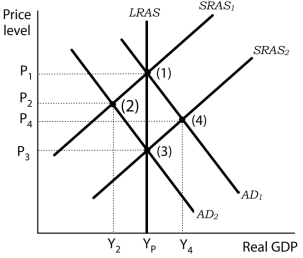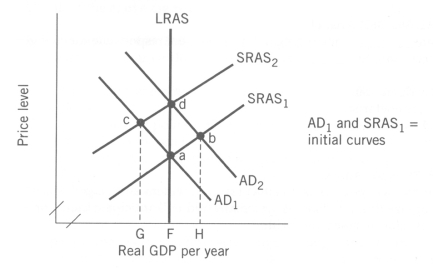Exam 17: A Brief History of Macroeconomic Thought and Policy
Exam 1: Economics: the Study of Choice136 Questions
Exam 2: Confronting Scarcity: Choices in Production189 Questions
Exam 3: Demand and Supply243 Questions
Exam 4: Applications of Supply and Demand104 Questions
Exam 5: Macroeconomics: the Big Picture141 Questions
Exam 6: Measuring Total Output and Income156 Questions
Exam 7: Aggregate Demand and Aggregate Supply162 Questions
Exam 8: Economic Growth131 Questions
Exam 9: The Nature and Creation of Money219 Questions
Exam 10: Financial Markets and the Economy169 Questions
Exam 11: Monetary Policy and the Fed173 Questions
Exam 12: Government and Fiscal Policy170 Questions
Exam 13: Consumption and the Aggregate Expenditures Model214 Questions
Exam 14: Investment and Economic Activity135 Questions
Exam 15: Net Exports and International Finance194 Questions
Exam 16: Inflation and Unemployment128 Questions
Exam 17: A Brief History of Macroeconomic Thought and Policy120 Questions
Exam 18: Inequality, Poverty, and Discrimination135 Questions
Select questions type
The Smoot-Hawley Tariff Act of 1930 contributed to the collapse of global trade
(Multiple Choice)
4.7/5  (32)
(32)
Use the following to answer questions
Exhibit: Responses to a Decrease in Aggregate Demand  -(Exhibit: Responses to a Decrease in Aggregate Demand)
The economy is initially in equilibrium at point (1)
.Now suppose a reduction in the money supply causes aggregate demand to fall to AD2.The below potential output level of Y2 will exist as long as
-(Exhibit: Responses to a Decrease in Aggregate Demand)
The economy is initially in equilibrium at point (1)
.Now suppose a reduction in the money supply causes aggregate demand to fall to AD2.The below potential output level of Y2 will exist as long as
(Multiple Choice)
4.9/5  (43)
(43)
The hypothesis that assumes that individuals form expectations about the future based on
Available information and that individuals act on that information is called the
(Multiple Choice)
4.8/5  (42)
(42)
Which of the following factors contributed to the sharp reduction in aggregate demand during the Great Depression?
I.reduction in wealth
II.reduced consumer confidence
III.tax increases
IV.an expansionary monetary policy that caused inflation
(Multiple Choice)
4.9/5  (38)
(38)
According to new classical economics, short-run stabilization policy works only if it
surprises people.
(True/False)
4.8/5  (35)
(35)
Use the following to answer questions
Exhibit: Economic Adjustments  -(Exhibit: Economic Adjustments)
Suppose the economy is at point a.Assume that (1)
The public's expectations are completely rational; (2)
Markets allocate resources instantaneously; and (3)
The economy is at its natural level of employment.The theoretical adjustment path resulting from an increase in aggregate demand according to the rational expectations hypothesis is
-(Exhibit: Economic Adjustments)
Suppose the economy is at point a.Assume that (1)
The public's expectations are completely rational; (2)
Markets allocate resources instantaneously; and (3)
The economy is at its natural level of employment.The theoretical adjustment path resulting from an increase in aggregate demand according to the rational expectations hypothesis is
(Multiple Choice)
4.9/5  (38)
(38)
Use the following to answer questions
Exhibit: Economic Adjustments  -Classical economics is based primarily on the works of John Maynard Keynes.
-Classical economics is based primarily on the works of John Maynard Keynes.
(True/False)
4.8/5  (29)
(29)
Keynes argued that the surest way to bring the economy out of the Great Depression was to
(Multiple Choice)
4.9/5  (25)
(25)
Which of the following statements is true about the Great Depression?
(Multiple Choice)
4.9/5  (37)
(37)
Economists who subscribe to the rational expectations hypothesis
(Multiple Choice)
4.9/5  (42)
(42)
The Case in Point titled "Tough Medicine" stated that the Keynesian prescription for an inflationary gap was to
(Multiple Choice)
4.8/5  (42)
(42)
Consider the following statement: "A consistent countercyclical policy has no effect on employment and output, since individuals will recognize those policies as systematic and will anticipate them correctly." This statement is most closely associated with
(Multiple Choice)
4.9/5  (38)
(38)
When did policy makers in the U.S.first use fiscal policy with the intent of manipulating
Aggregate demand to move the economy to its potential level of real GDP?
(Multiple Choice)
4.9/5  (43)
(43)
One distinguishing feature of new Keynesian economics (from earlier schools of thought)
is the greater use of microeconomic analysis in macroeconomic analysis.
(True/False)
4.8/5  (40)
(40)
According to new classical economics, individuals will respond to expansionary monetary
Policy by
(Multiple Choice)
4.8/5  (35)
(35)
In the 1960s, despite the successful application of expansionary fiscal policy in the United States, Milton Friedman argued that
(Multiple Choice)
4.8/5  (30)
(30)
Showing 61 - 80 of 120
Filters
- Essay(0)
- Multiple Choice(0)
- Short Answer(0)
- True False(0)
- Matching(0)